Nike Wildhorse 10 Review: Is it a Workhorse? Or a Horse with Wings? – Believe in the Run
Trail Running Shoes • July 29, 2025
We independently review everything we recommend. When you buy through our links, we may earn a commission.
What You Need To Know
10.8 oz. (306 g) for a US M9 / 9.3 oz. (264 g) for a US W7.5
38 mm in heel, 28.5 mm in forefoot (9.5 mm drop)
Nike ATC outsole, ReactX midsole, Engineered mesh upper, Forefoot rock plate
Super-plush ride
Nike ATC rubber is good, not great
Maybe not the most generous trail fit
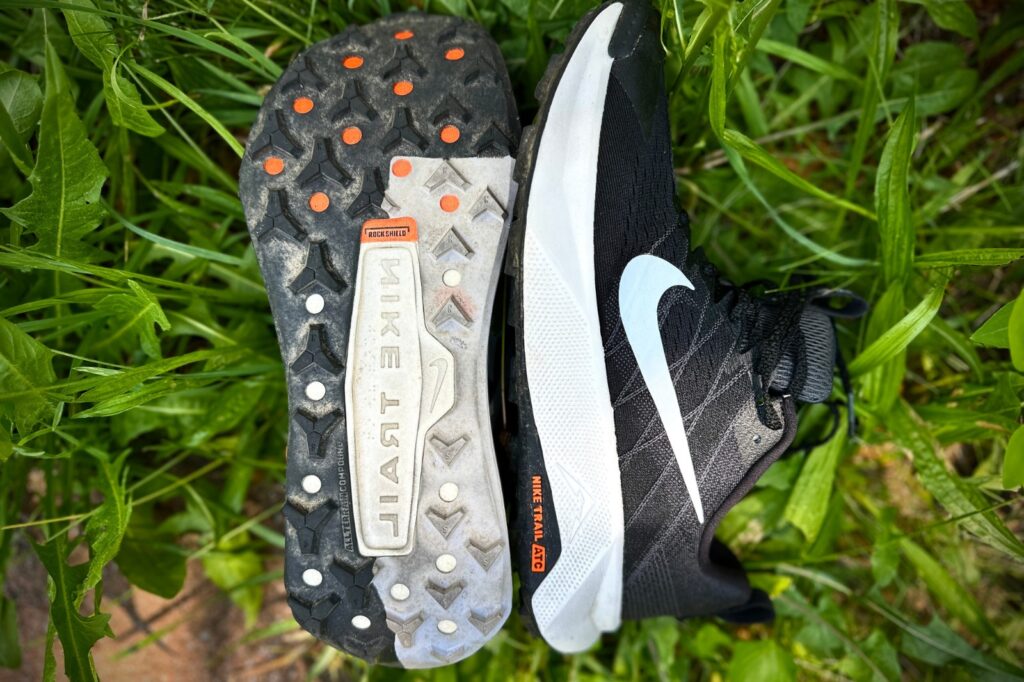
Introduction to the Nike Wildhorse 10
SAM: Last time we got our feet into a Nike Wildhorse, Michael nicknamed it the “Horsey Ocho” and wrote a whole haiku about it. That must have been too wild for the Wildhorse, because Nike skipped the Wildhorse 9 entirely. Just jumped the number from 8 to 10 like this shoe was an iPhone or something. Whatever the reason, this year we got that 9th iteration, the Nike Wildhorse 10. It has 3 mm more ReactX underfoot, and a whole new styling and upper material that hews closer to where the rest of Nike’s trail lineup currently lives.
Wild nicknames aside, we found much to love with the Horsey Ocho. It was nimble, comfortable, and fun, and it featured the reformulation of Nike’s once-infamously bad trail outsole rubber. With the Wildhorse 10, they’ve named that once-bad, now-fine rubber the Nike All Terrain Compound, or ATC. More foam underfoot and a decent outsole should only equal more of a good thing, so I was looking forward to my miles in the Wildhorse 10.
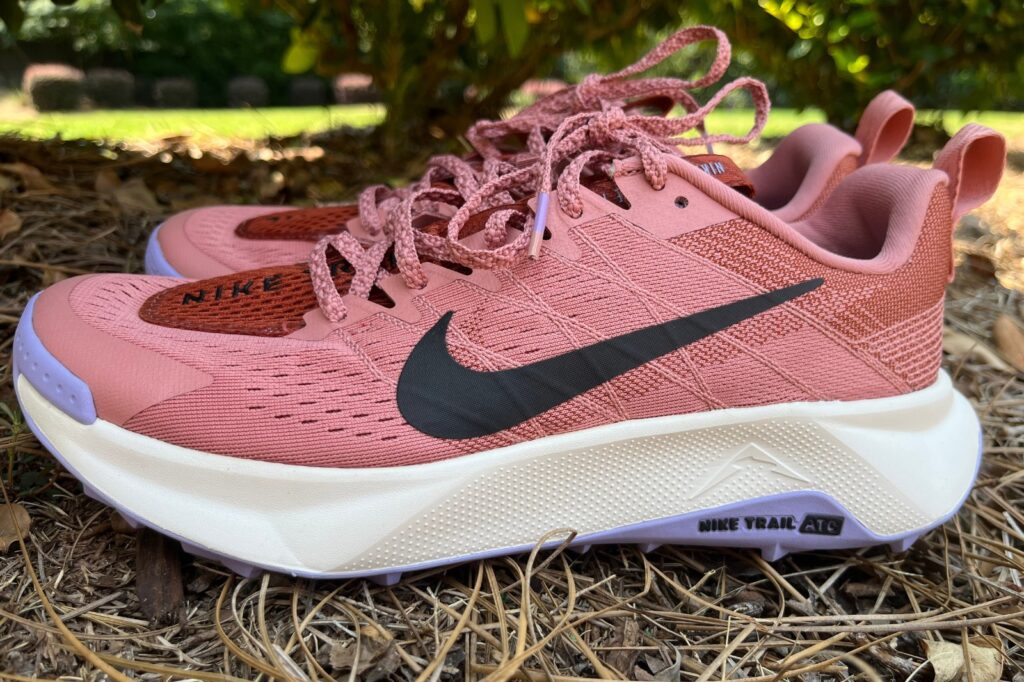
ALLISON: No, I didn’t talk like a cowboy when I got the Nike Wildhorse 10 in the mail like Michael did in his previous review of the Wildhorse 8, but I did start singing Wild Horses by the Rolling Stones. Totally the same thing, right? Well, see below if I had to be “dragged away” from the shoes in our review.
MICHAEL: Unfortunately, buckaroo Michael is taking his annual trip around Wyoming to sing campfire songs and howl at the moon or whatever he does, so it’s just plain ol’ Michael reporting this time on version 10 of the Wildhorse. I tried giving buckaroo Michael a call since he had so much fun reviewing the beloved ocho, but he said he was recently bitten by a rattlesnake and couldn’t join in on the fun.
I think it’s just a lame excuse. He expressed so much frustration earlier that the name “Horsey Diez” doesn’t sound quite as nice as “Horsey Ocho,” but I think he’s just playing hooky. So enough with the tall tales, let’s get on with the review.
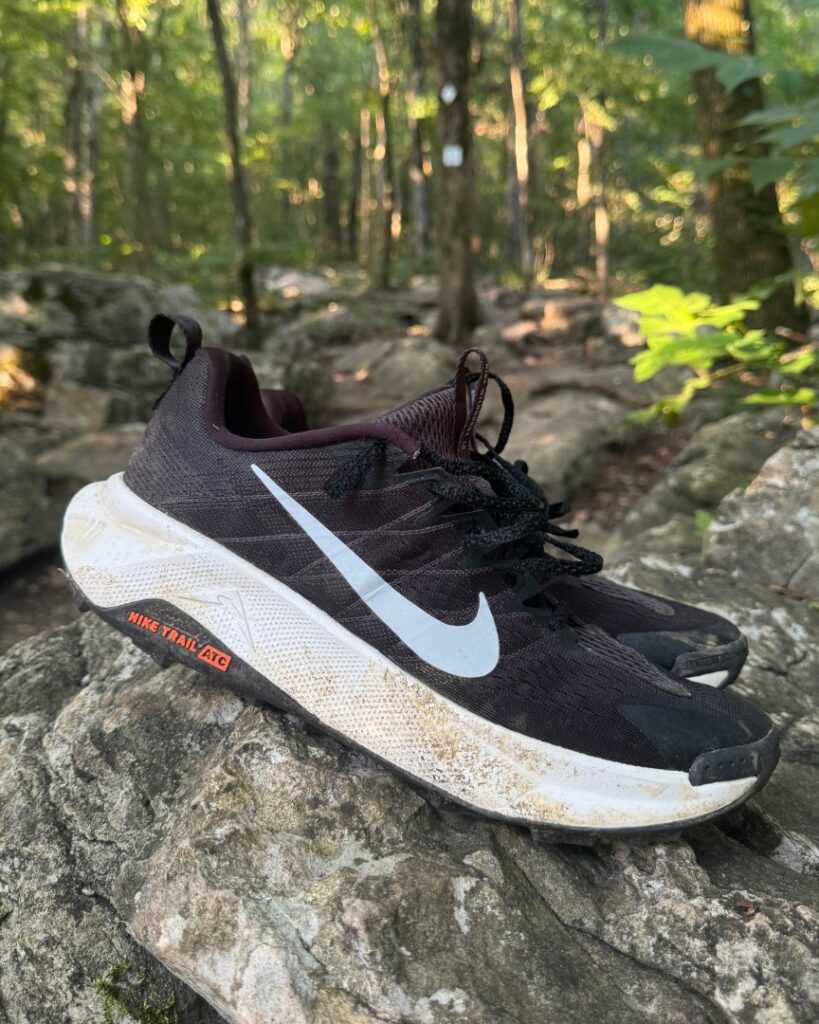
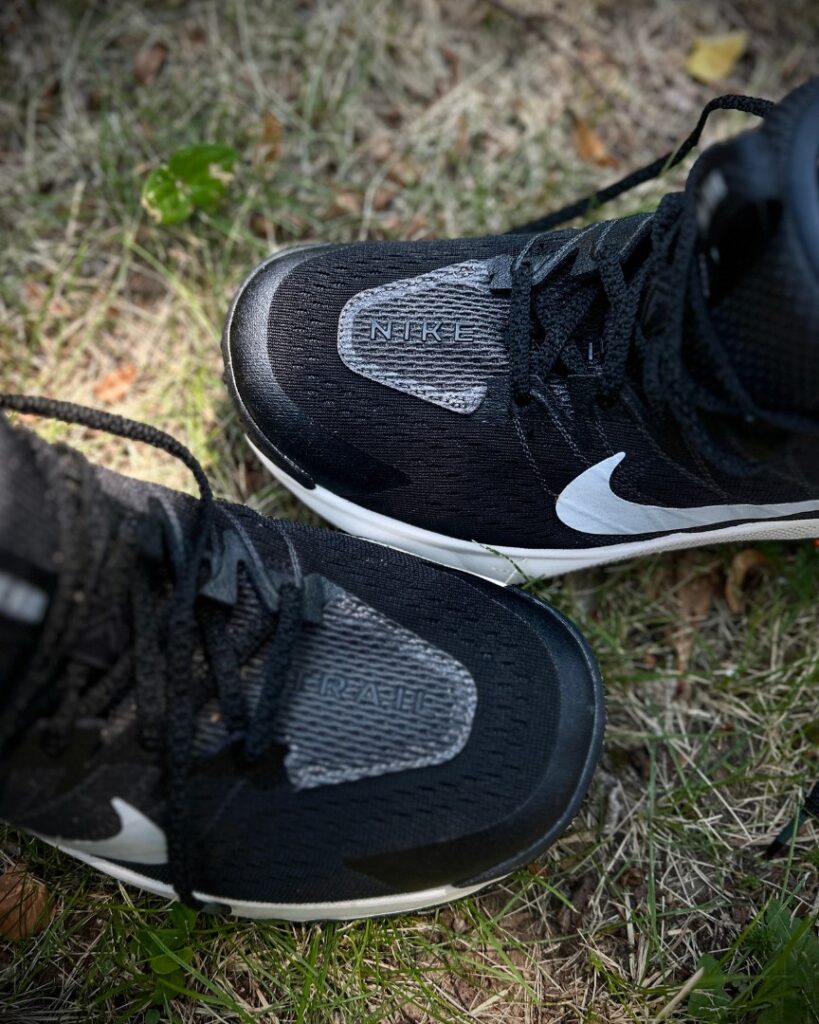
What we like about the Nike Wildhorse 10
SAM: When Tolkien wrote of Bilbo Baggins’ Bag End in the opening lines of The Hobbit, his insistence that it “was a hobbit hole, and that means comfort,” could be transcribed to refer to the Nike Wildhorse 10. This shoe seriously feels great on foot. And while it might not be quite as spacious inside as Bag End, the soft engineered mesh does fit true to size. Even where it ran a little narrow for my foot, I didn’t experience any discomfort.
The Wildhorse 10’s visual styling has been scaled back from the new tech-outdoors look of the Wildhorse 8. A simple, single-layered engineered mesh replaces what was a thin, two-tone double-layered mesh. The top of the toebox has an elastic extension of the tongue that reaches out over your toes, a la Hoka’s Speedgoat series.
It looks cool here, but I couldn’t point to anything specific that it added to my test runs. It could be so that you can take in some of the upper more easily, but see below for more there. On the instep of the shoe is an oversized Nike Trail logo that stretches down over the midsole. This is my favorite part of the design. I don’t necessarily go for ostentatious logo placement, but this one, located where it is, just works.
The real locus of comfort in this shoe, however, is in the ReactX Midsole. It’s so soft. You see Michael talk below about the almost 9.5 mm heel-to-toe drop in this shoe, and I’m going to lay it all out up here: I didn’t notice because the ReactX in the heel is so soft and squishy. Standing still, I felt like my weight pushed the heel almost to a reverse drop. Luckily, you don’t feel that on the run. However, the magic of ReactX is that the foam retains a pleasant responsiveness despite how soft it feels.
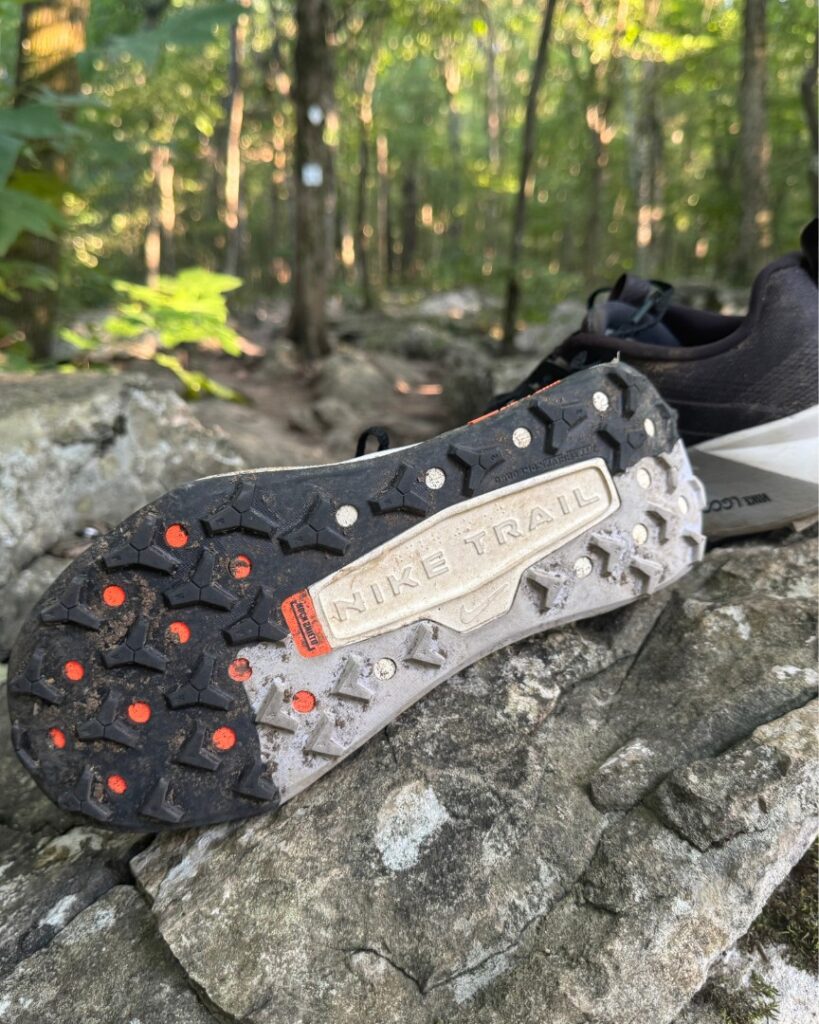
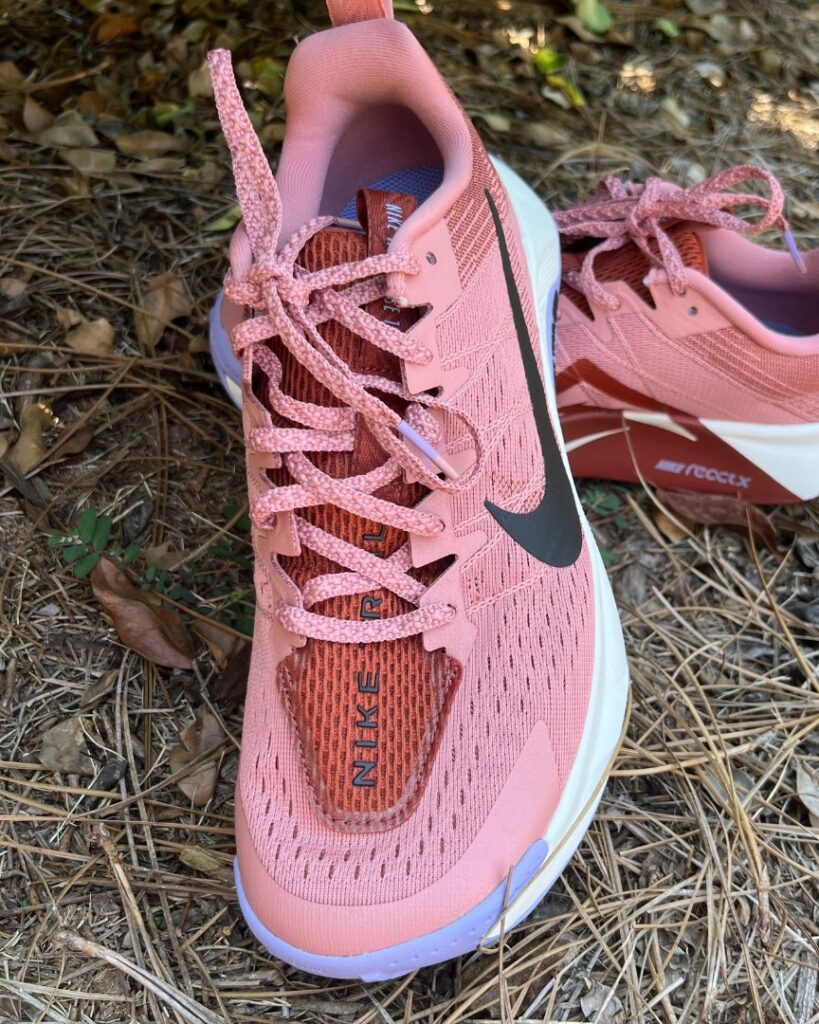
The Wildhorse 10 follows its predecessor in creating a nimble feeling through foam that feels slightly firmer and responsive when compressed beneath the longline of your foot. Side-to-side, the ReactX platform feels like it has a slight roll, which walks right up to the line of being too wobbly on flat trails and pavement (more on that below).
It seems like this is from the foam around the edges of the midsole having less resistance to compression. I know this sounds like a bad thing, but just like on the Wildhorse 8, this slight side-to-side roll creates a perception of narrowness underfoot that reads as nimbleness. I think it’s a fun twist in how a thicker, wider midsole runs.
Luckily, with all this soft foam underfoot, the forefoot of the Wildhorse 10 had a flexible rock plate that sits right between the midsole and outsole. It seems Nike wants to prove it listened after the Wildhorse 8, and the rock plate it (supposedly) had didn’t really perform. So this one is brightly colored and visible through the gaps in the outsole.
That outsole with its new Nike ATC branding is perfectly serviceable on almost all surfaces. It won’t be coming for Vibram’s crown or anything, but I also felt reasonably confident when conditions were sloppy.
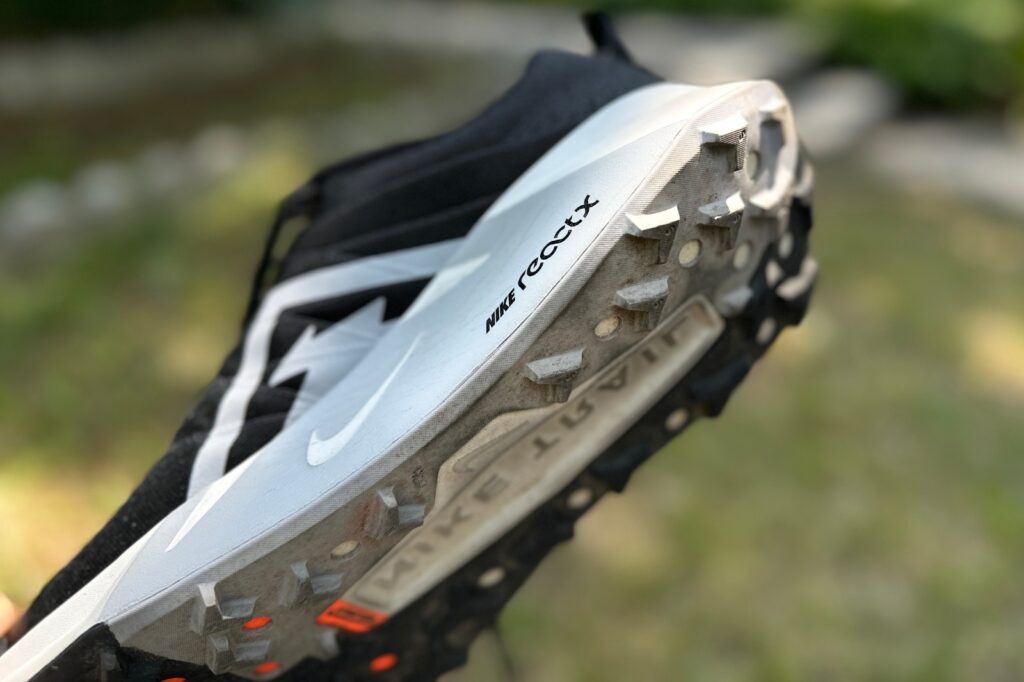
MICHAEL: Like its storied predecessor, the Wildhorse 10 makes excellent use of Nike’s softest, most luxurious midsole foam underfoot – ReactX. The result is a shoe that is unbelievably comfortable on step-in. Honestly, it feels like someone took a pair of those Oofoos flip-flops that everyone likes to pretend look cool and tacked on trail garb, except make the midsole even more durable and bouncy underfoot. Sure, all the softness has some downsides we’ll get to later, but there’s no denying this is a comfortable midsole for munching up miles.
Adding to the comfort of the shoe, a single-layer mesh upper provides adaptable comfort, especially through the lacing chain. Reminiscent of Saucony’s old ISOFIT technology, each lace eyelet is isolated from the other, allowing for a more adaptable fit over the contours of the bony parts of the top of my foot.
Oftentimes, to avoid irritation in the protruding bone in the top of my foot (I believe it’s my medial cuneiform? Thanks, Google), I have to sacrifice some security across one of the eyelets. Such is not the case with the Wildhorse 10, and I love it. Adding to the comfort, a tastefully padded heel counter and roomy toebox round out the upper.
Underneath the midsole, Nike incorporates a forefoot rock plate to abate some of the trail chatter that inevitably seeps through the ReactX. It’s no secret that I love rock plates, and after there was reportedly one (?) in the Horsey ocho that was hidden from sight, it was great to lay eyes on it this time in all its bright orange glory. Perhaps it was the looks, but I felt like I could feel the plate working more this time, providing a legitimate boost of protection that makes the technical trails in Huntsville much more enjoyable, a benefit hardly noticeable in version eight.
Lastly, the Nike Trail aesthetic is always a bonus. That being said, I feel like the more rugged styling of the Horsey Ocho did a better job of communicating the shoe’s proposed capability on more technical terrain than the more road-to-trail-oriented model of Nike’s lineup, like the Pegasus Trail. So while it’s still a great-looking shoe, I think version 10’s unmistakable visual similarities to the Peg Trail line will bring me to some of its downsides.
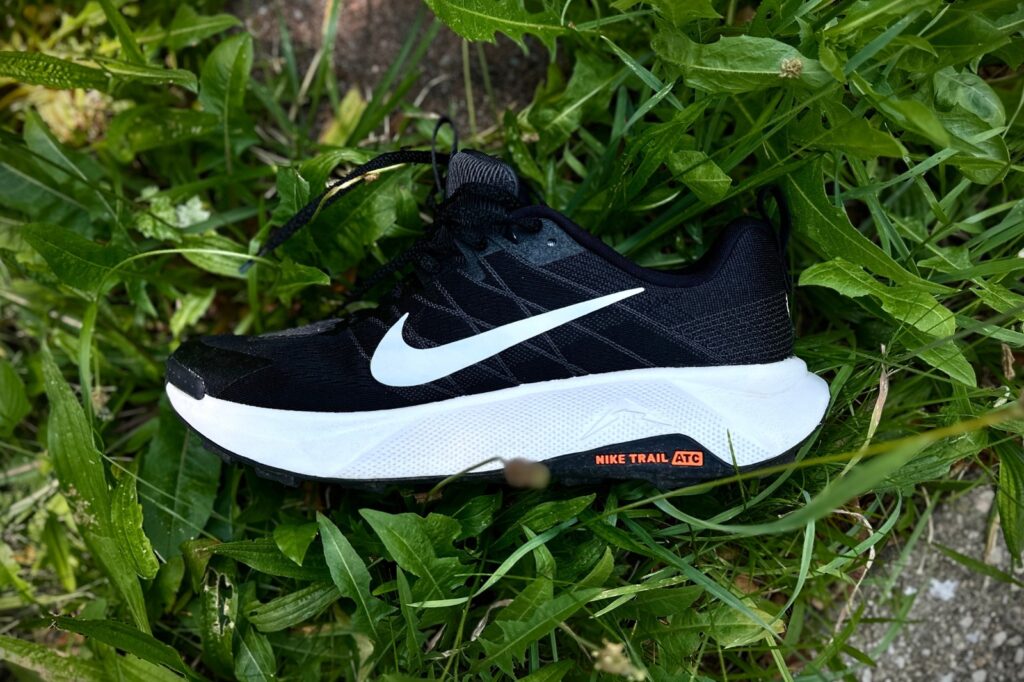
ALLISON: I won’t take up too much time talking about the positive aspects of the shoe, as the guys above have nailed the topics I was going to discuss. First and foremost, the shoe fits true to size, which was a relief after experiencing inconsistent sizing with brands like Inov-8 and Ronhill in the last few reviews I’ve done. The secure, dialed-in fit provided confidence on varied terrain without feeling too tight or restrictive.
One of the highlights is the gusseted, padded tongue, something Nike absolutely nailed here. It prevents debris from entering the shoe and adds a layer of comfort across the top of the foot, reducing pressure from laces on longer runs that I’ve experienced with other shoes.
Aesthetically, the Wildhorse 10 is one of the best-looking trail shoes on the market. Nike has managed to blend performance-ready design with sleek, eye-catching colorways that look just as good on a post-run coffee stop as they do out on the trail. The material of the ReactX midsole feels durable, as the shoe overall delivers a smooth, cushioned ride on gravel, hard-packed dirt, and even some light technical terrain. For runners who like thoughtful design features of a Nike Pegasus with a bit of trail style, the Wildhorse 10 makes a compelling case.
Shop The Shoe – Men
Shop The Shoe – Women
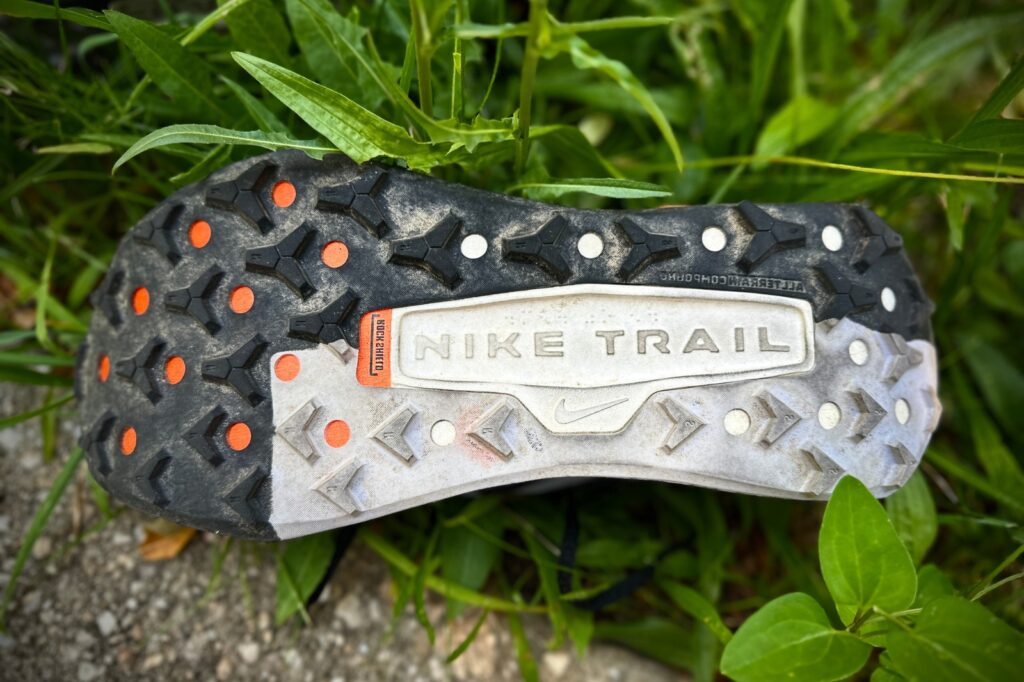
What we don’t like about the Nike Wildhorse 10
SAM: After the roomy-yet-nimble fit in the Wildhorse 8, I was surprised that the Wildhorse 10 felt a little tighter across the ball of my foot. The upper is forgiving enough that I didn’t mind this much, but the lateral edge of my foot just pushed over the edge of the midsole. It feels a little constricting all around, honestly.
Speaking of the midsole, all that squishy ReactX is too soft to tackle technical trails confidently. That nimble feeling from the compressed midsole along the middle longline of your foot is nice on flat trails and roads, but the edges of the foam seem to compress more and more easily than the middle. This results in a wobbly, unsteady step on tilted or rocky trails.
Underneath the wobbly midsole, the Nike All Terrain Compound rubber struggled on wet rocks and boardwalks. It’s not quite the entirely dire situation on wet surfaces that it used to be, but I found that the grip was just squirrelly enough to eat at my confidence. Maybe keep in mind that there’s a tiny, imaginary asterisk chasing the “ATC” labelling.
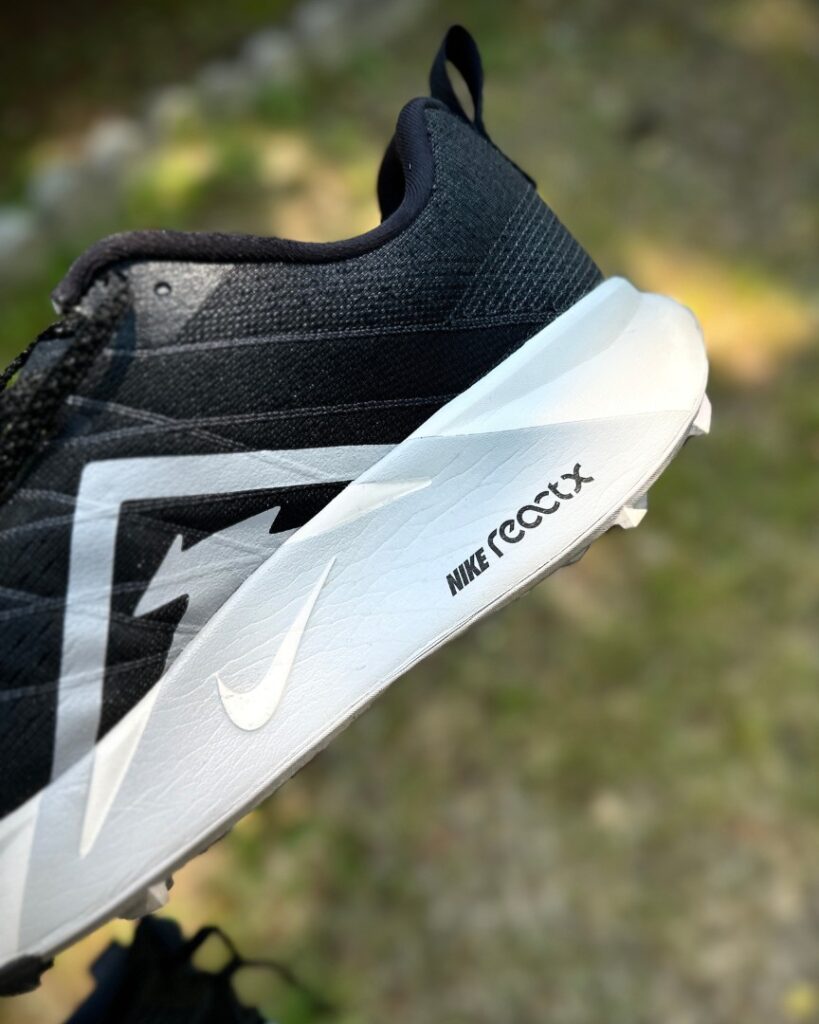
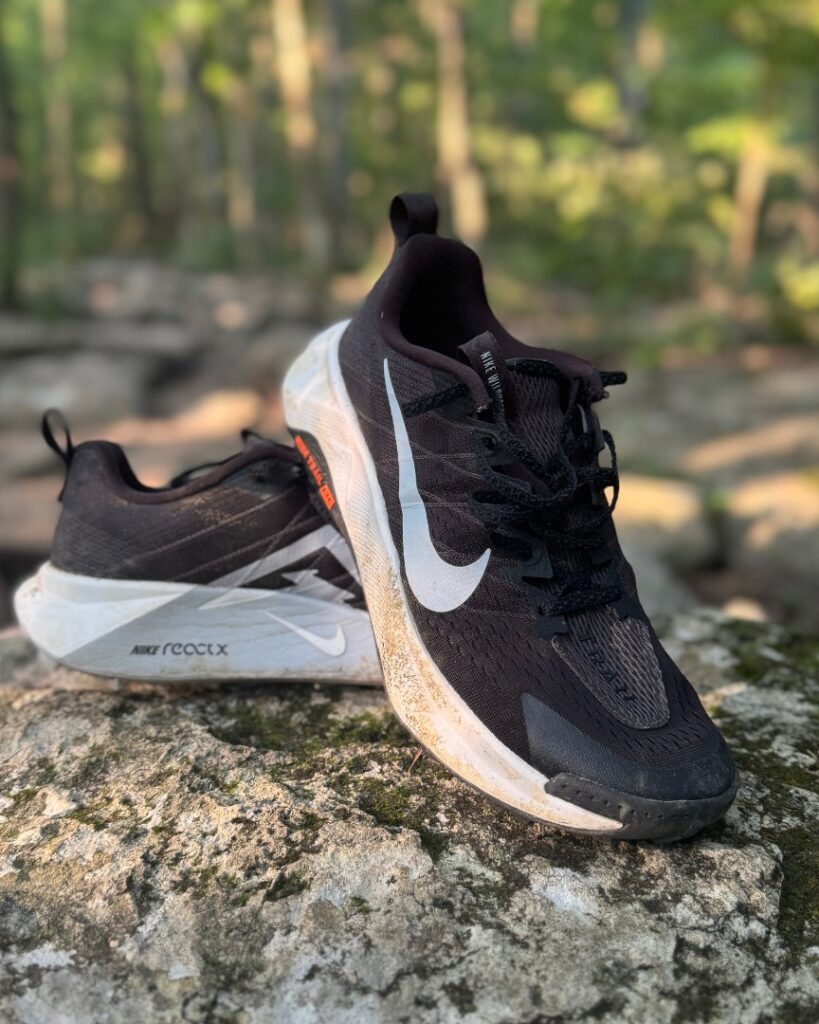
MICHAEL: First things first, this midsole, like Sam mentioned, is just too soft for use on technical terrain. Each heel strike is unstable, and the single-layer mesh upper has too much stretch to pull back the reins on this cowboy-buckin’ foam. Whenever I sent this shoe down a steep descent, my forefoot slid all over the place, rolling over the side of the shoe and whatnot.
The unstable heel and loose fit in the forefoot were only further amplified by a 9.5 mm heel-toe drop, which, in our experience, is rarely an excellent value for a shoe trying to be versatile. Also, while it has generally improved over the years, Nike’s lackluster performance of ATC (more like STC, Some-Terrain-Compound) leaves something to be desired on wet rocks.
This brings me to my final conclusion, namely that we are witnessing the Pegasus-ification of the Nike trail line. Besides lug depth and a thin rock plate, I don’t think anything seems to be separating version 10 of the Wildhorse from version 5 of the Pegasus trail, especially regarding technical terrain capability. Like I mentioned before, they even look similar. Luckily for the Wildhorse, the Peg Trail 5 is a great shoe to have a bit of overlap with… You might just want to manage expectations for it on “double black” singletrack.
ALLISON: While the Nike Wildhorse 10 has some strong points, several drawbacks held it back for me. The most noticeable issue was the narrow fit. It felt tighter than expected, especially in the midsole. This might be uncomfortable for runners with wider feet or those doing longer distances. The shoe felt a bit heavy on the run, especially compared to other trail options. The added weight, combined with a somewhat bulky design, made it feel sluggish on more demanding trails.
The traction also left much to be desired. On technical terrain, I found myself holding back, lacking the confidence I get from other trail shoes. It’s ironically named the “Wildhorse,” but I wouldn’t get too “wild” wearing it on anything too rugged. The upper also wasn’t very breathable, which became a real issue during hot summer runs. Additionally, there’s limited drainage, so water tends to linger inside the shoe, which is definitely not ideal for creek crossings or rainy days.
Finally, the $25 price increase from the previous model feels hard to justify given these compromises. While it may work well for smoother trails, the Wildhorse 10 falls short for more technical or extreme conditions.
Shop The Shoe – Men
Shop The Shoe – Women
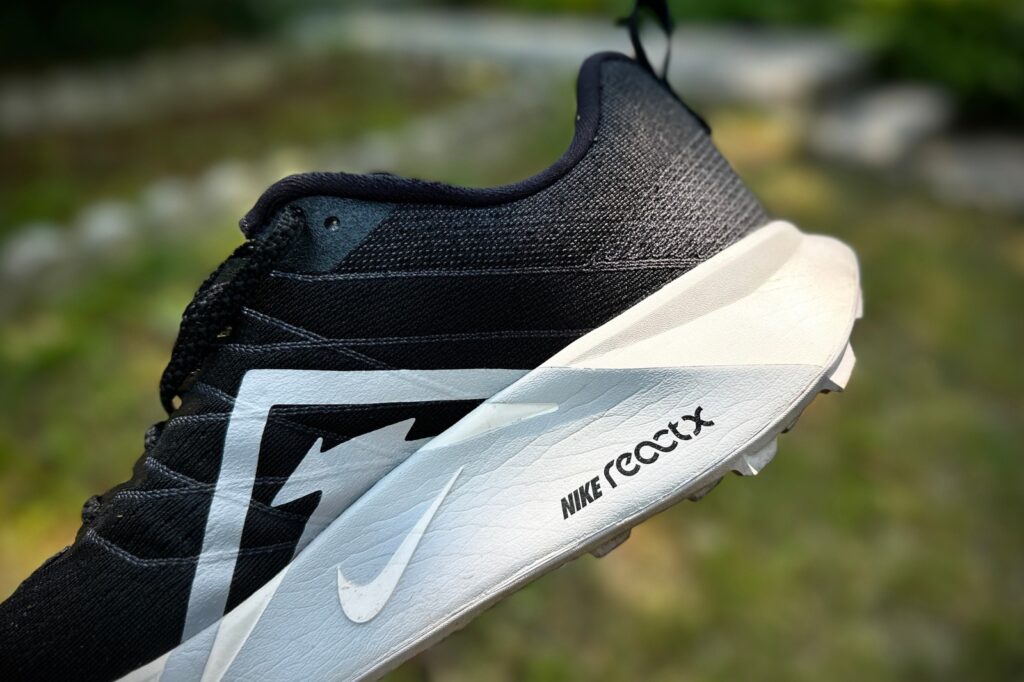
Final thoughts on the Nike Wildhorse 10
SAM: The Nike Wildhorse 10 is, by all accounts, a great running shoe. The comfort of the ReactX midsole alone makes this shoe a pleasure to tick off miles in. Top that off with Nike’s storied sleek styling and a comfortable upper, and this is a competitive pick on most any shoe wall.
But if you read this review closely enough, you’ll see that we mentioned the Nike Pegasus and Pegasus Trail almost as much as we mentioned the Wildhorse, and I’m a little worried that there’s not quite enough that sets this shoe apart from its slimmer sibling. For $10 more, you get a little more foam that can’t handle distance or technical sections all that much better. If you want a technical shoe from Nike, the Terra Kiger is right there. That leaves our trusty Wildhorse out in the cold as a shoe that essentially runs and looks like the Peg Trail 5, just more expensive.
The 10th (9th? I don’t know how these things work) version of the Wildhorse is also $25 more expensive than the Horsey Ocho. And I know that running shoes are in an absolute bind right now. Between inflation and ever-fluctuating tariffs, I’m counting it a win that we’re still getting reasonably priced shoes at all, but $25 feels like a hefty leap.
The Nike Wildhorse 10 is best used as a plush road-to-trail grinder. It’s a great choice if you love soft midsole foam with a moderate stack that’s still responsive and fun. Current analogues are the Salomon Aero Glide Grvl and the Craft Xplor Hybrid.
MICHAEL: Despite its aforementioned Pegasus-ification, the Wildhorse 10 is still a great shoe. Its uber-comfortable platform makes most runs quite enjoyable, and it may have some of the best step-in comfort I’ve ever tested. However, the key here will be to keep it on the terrain it’s designed for, not the terrain the name suggests it’s good for.
Think of it as a road/trail hybrid (aka a Pegasus trail with slightly deeper lugs), and you’re going to love every run. Think of it as a Hoka Speedgoat or Brooks Cascadia alternative for all-mountain racing, and you’re going to find yourself doing the wobble on technical descents. For a more fun conclusion, please see Allison’s nimble pony metaphor below.
ALLISON: I appreciated the aesthetics of the Wildhorse 10, but it may not be the best choice for long runs on rocky terrain. The cushioning and support felt more suited for lighter efforts, making this shoe less ideal for extended, technical outings. However, for smoother paths like gravel roads or rail-to-trail routes, it truly shines. Think of this shoe as a nimble pony that prefers well-groomed trails over rugged backcountry.
You can pick up the Nike Wildhorse 10 for $165 from Nike by using the buttons below.
Shop The Shoe – Men
Shop The Shoe – Women
Previous Post
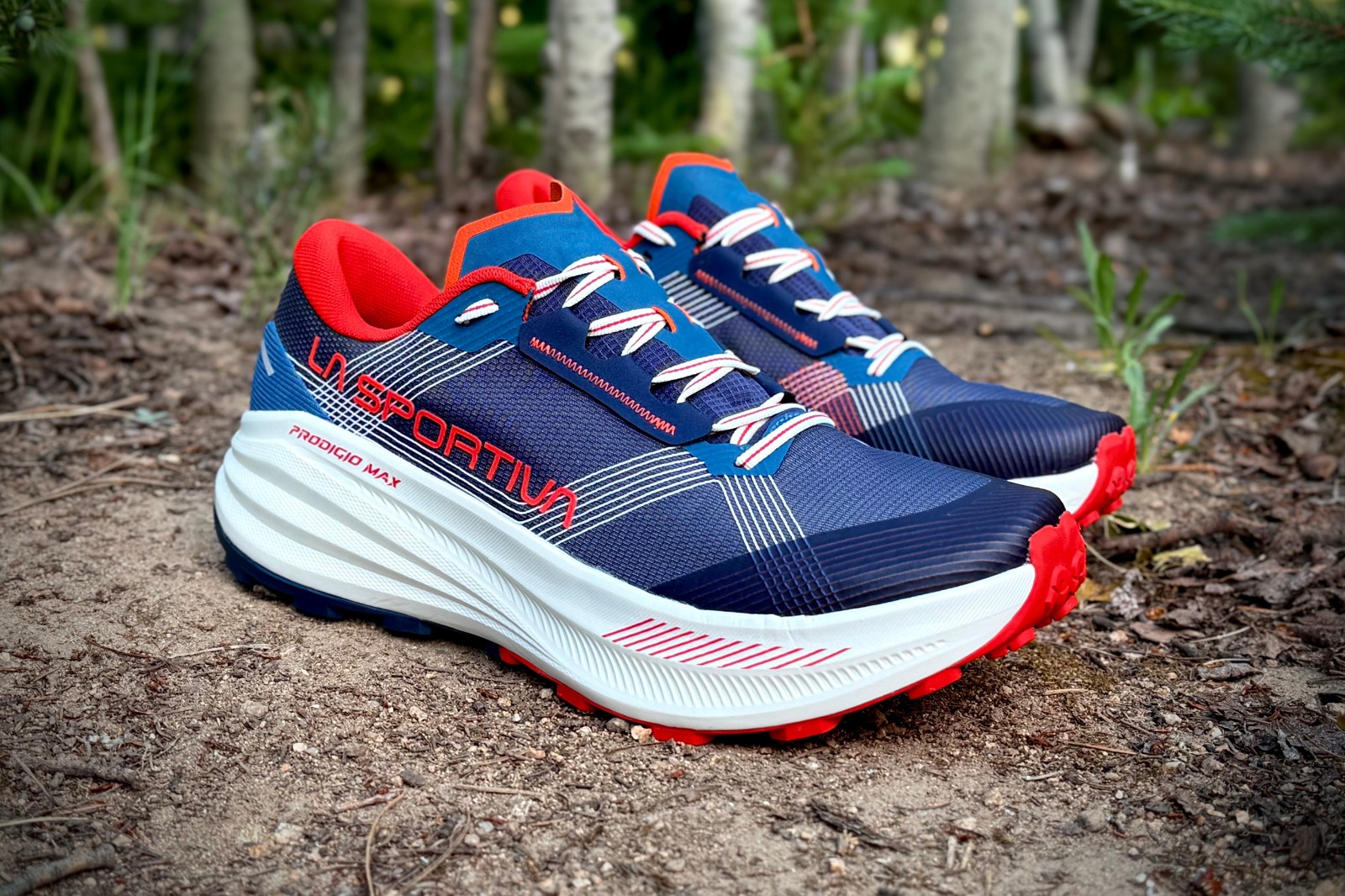
Trail Running Shoes • July 29, 2025















